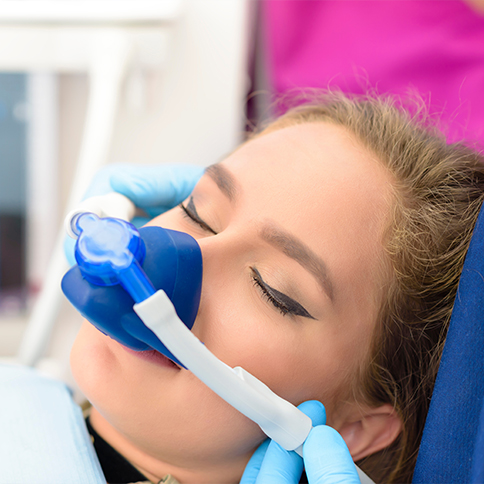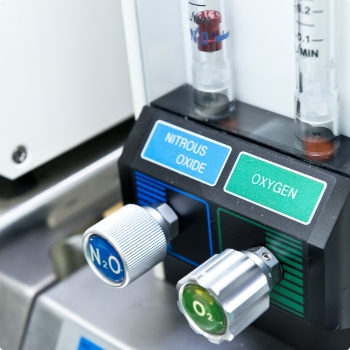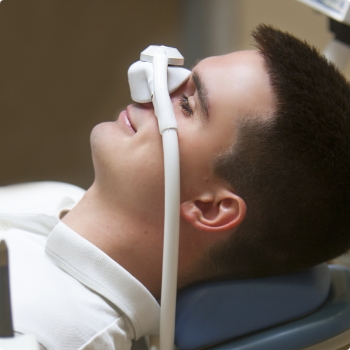Sedation Dentist Weatherford
Your Nerves Are Quickly Calmed with Sedation
A lot of people suffer from many different fears, but one of the most common is the fear of the dentist. Having a fear of the dentist can prevent someone from receiving the much-needed dental work they need. When they delay this dental work, it often leads to a much more serious problem down the road, resulting in a far more painful and expensive experience.
At Cosmetic and Family Dentistry of Weatherford, we understand and appreciate your dental fears, and we take pride in making sure you have the best experience possible at our dental office. Dr. Ashley Decker and Dr. Garrett Mulkey offer nitrous oxide sedation dentistry to their patients, offering them the much-needed relaxation and comfort they need. Call our office to schedule your next appointment and learn how sedation dentistry in Weatherford can help you!
Why Choose Cosmetic & Family Dentistry of Weatherford for Sedation Dentistry?
- Two Types of Sedation Available
- Same-Day Emergency Appointments
- Your Dental Insurance is Welcome
Oral Conscious Sedation

Moderate to severe dental anxiety often calls for oral conscious sedation. With stronger effects than those that arise while under nitrous oxide sedation, the use of a prescribed pill that is taken before treatment allows you to feel fully relaxed throughout your visit. While still aware of your surroundings, you’ll respond to dental cues but have little recollection of your appointment after treatment is complete.
Nitrous Oxide Sedation

If you need a mild dental sedative, try nitrous oxide sedation in Weatherford. This option lets you remain calm yet lucid during treatment – all without any grogginess afterward! Given that effect, it’s highly effective on those who get antsy at the dentist. If you’d like to learn more about it, we at Cosmetic & Family Dentistry of Weatherford can happily explain. All you have to do is keep reading or call our office for the relevant details!
Who Is a Good Candidate for Nitrous Oxide?

Almost any adult can qualify for nitrous oxide sedation because it's safe and effective. That said, the option does benefit some patients more than others. In particular, it’s most likely to help those with the following:
- A phobia of needles
- Dental anxiety or overstimulation
- Difficulty sitting still
- A strong gag reflex
- Dental sensitivity
- A resistance to numbing agents
Occasionally, some patients aren’t good candidates for nitrous oxide. For example, a pregnant patient may want to avoid it due to its effects on their pregnancy. Similarly, those with sinus congestion or respiratory disease may not be well enough to inhale through the nose mask.
How Does Nitrous Oxide Work?

It involves a few steps, but applying nitrous oxide isn’t hard. Setting up the sedation method only takes a few minutes at most. Once that’s done, the dentist can use it throughout your treatment.
Before your procedure, the dentist will give you nitrous oxide through a nose mask. The latter tool ensures you fully and deeply inhale the gas. That way, you’ll quickly be sedated when your dentist starts working. From there, our team will monitor your vitals so that no problems occur.
After inhaling the nitrous oxide for a few minutes, you’ll feel its effects. Namely, your body will be relaxed and your mind at ease, ensuring the dental work goes more smoothly. Just keep in mind that your limbs can sense changes too. In particular, your arms or legs may feel tingly or heavier than usual. Still, the sedative will leave you alert and lucid; you’ll thus be able to respond to questions or instructions.
Aftercare for Nitrous Oxide

Overall, there isn’t much aftercare necessary for nitrous oxide. It’s ultimately a sedative that doesn’t last long.
A major perk of nitrous oxide is that it has virtually no side effects. When our dental work is done, and we remove your mask, it’ll quickly stop affecting you. As a result, you’ll be well enough to drive in mere minutes. You can then head back home or work and continue your day.
Of course, your treatment may be (or is) a bit special. In that case, you’ll want to follow any procedure-specific recovery tips your dentist gives you. Otherwise, you may not recover from the nitrous oxide as quickly.
I Need a Checkup & Cleaning I Need Help with a Lip and/or Tongue-Tie I am Worried About Gum Disease I Have a Cavity or Broken Tooth I am Missing One or More Teeth I Want to Enhance My Smile I Want a Straighter Smile I Have Jaw Pain I'm Having Trouble Sleeping I Have a Dental Emergency View Our Services
